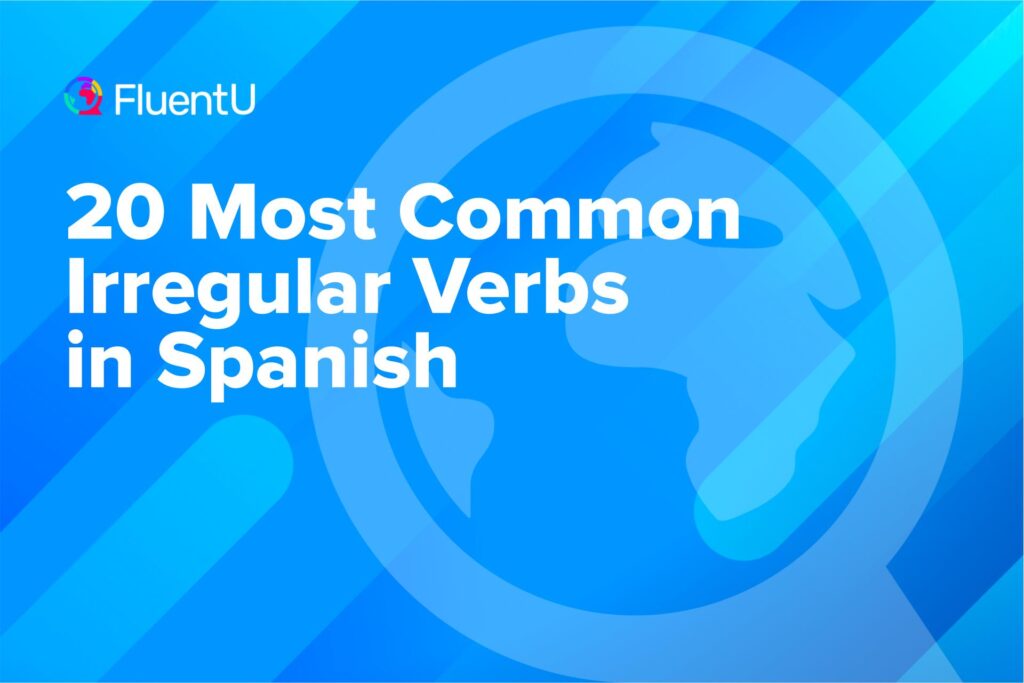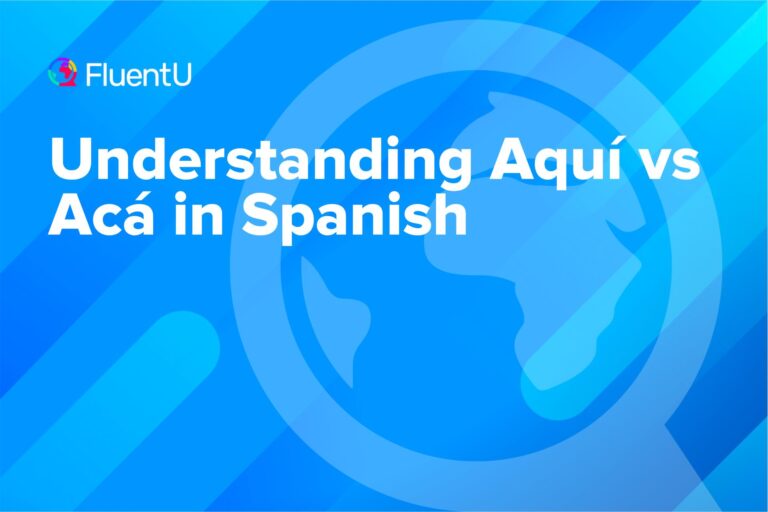Contents
- Most Common Irregular Verbs in Spanish
- 1. Ser – To be
- 2. Estar – To be
- 3. Haber – To be
- 4. Tener – To have
- 5. Poder – To be able
- 6. Hacer – To do, to make
- 7. Ir – To go
- 8. Poner – To place, to put
- 9. Decir – To say
- 10. Ver – To see, to watch
- 11. Querer – To want, to care about
- 12. Saber – To know, to taste
- 13. Llegar – To arrive
- 14. Creer – To think, to believe
- 15. Encontrar – To find, to meet
- 16. Venir – To come
- 17. Pensar – To think
- 18. Conocer – To know
- 19. Sentir – To feel, to feel sorry
- 20. Volver – To return, to do again
- What Are Spanish Stem-changing Verbs?
- How Many Irregular Verbs Are There in Spanish?
- And One More Thing…
20 Most Common Irregular Verbs in Spanish

There are lots of irregular verbs in Spanish, so it won’t take long until you run into them on your learning journey. Some of the most common verbs that you’ll use everyday—like ir (to go), estar (to be), ser (to be) and more—don’t follow the regular -ar, -er and -ir conjugation patterns.
But the good news is Spanish irregular verbs aren’t as baffling as they first appear. In this post, you’ll learn 20 of the most common irregular verbs in Spanish, how many there are in total, how to conjugate them and more.
You can also watch this story-based lesson on our YouTube channel:
Download: This blog post is available as a convenient and portable PDF that you can take anywhere. Click here to get a copy. (Download)
Most Common Irregular Verbs in Spanish
1. Ser – To be
Ser is particularly irregular in all of the present, past and subjunctive tenses, as well as the imperative, but it does follow the rules for the future, conditional and past participle.
This form of to be is used when something or someone has a quality, possession, price or origin.
| Subject | Present | Preterite | Imperfect | Future Simple |
|---|---|---|---|---|
| Yo | Soy | Fui | Era | Seré |
| Tú | Eres | Fuiste | Eras | Serás |
| Él/Ella/Usted | Es | Fue | Era | Será |
| Nosotros | Somos | Fuimos | Éramos | Seremos |
| Vosotros | Sois | Fuisteis | Erais | Seréis |
| Ellos/Ellas/Ustedes | Son | Fueron | Eran | Serán |
Examples:
¿De donde eres? (Where are you from?)
Fuimos los campeones. (We were the champions.)
2. Estar – To be
Estar also has its own unique conjugations, though it’s regular in more tenses than ser (to be).
It’s irregular in the present, preterite and future subjunctive.
As you can see, both ser and estar mean “to be,” but estar is used for feelings, locations and temporary states.
If you haven’t mastered differentiating these two verbs yet, I highly recommend bookmarking our in-depth guide on ser vs. estar here to check out next.
| Subject | Present | Preterite | Future Simple |
|---|---|---|---|
| Yo | Estoy | Estuve | Estaré |
| Tú | Estás | Estuviste | Estarás |
| Él/Ella/Usted | Está | Estuvo | Estará |
| Nosotros | Estamos | Estuvimos | Estaremos |
| Vosotros | Estáis | Estuvisteis | Estaréis |
| Ellos/Ellas/Ustedes | Están | Estuvieron | Estarán |
Examples:
Los pingüinos están molestos. (The penguins are angry.)
¿Dónde está el baño? (Where’s the toilet?)
3. Haber – To be
Haber is used as an auxiliary verb in the same way that English uses have. For example, he comido (I’ve eaten).
Conjugations of haber you’ll use often include hay (there is/are) and hubo (there were). For a more in-depth rundown on how to use haber specifically, check out our complete guide here.
| Subject | Present | Preterite | Future Simple |
|---|---|---|---|
| Yo | He | Hube | Habré |
| Tú | Has | Hubiste | Habrás |
| Él/Ella/Usted | Ha, hay | Hubo | Habrá |
| Nosotros | Hemos | Hubimos | Habremos |
| Vosotros | Habéis | Hubisteis | Habréis |
| Ellos/Ellas/Ustedes | Han | Hubieron | Habrán |
Examples:
Hay un dragón en la colina. (There’s a dragon on the hill.)
Hubo un accidente en la autopista. (There was an accident on the road.)
4. Tener – To have
The present and subjective form of tener is completely irregular, but otherwise its irregularities often just involve an e-to-ie stem change, and tuv– for the past and subjunctive future.
Tener can be similar to haber in usage, so consider reading our post on tener vs. haber here if you don’t know the differences.
| Subject | Present | Preterite | Future Simple |
|---|---|---|---|
| Yo | Tengo | Tuve | Tendré |
| Tú | Tienes | Tuviste | Tendrás |
| Él/Ella/Usted | Tiene | Tuvo | Tendrá |
| Nosotros | Tenemos | Tuvimos | Tendremos |
| Vosotros | Tenéis | Tuvisteis | Tendréis |
| Ellos/Ellas/Ustedes | Tienen | Tuvieron | Tendrán |
Examples:
Tengo que irme ya. (I have to go now.)
Maria tiene dolor de cabeza. (Maria has a headache.)
5. Poder – To be able
Poder follows the same model as many irregular verbs, changing o to ue or to u, though be aware that its future form gets a bit complex.
In all irregular verbs, when these changes to ue occur, nosotros is never affected.
| Subject | Present | Preterite | Future Simple |
|---|---|---|---|
| Yo | Puedo | Pude | Podré |
| Tú | Puedes | Pudiste | Podrás |
| Él/Ella/Usted | Puede | Pudo | Podrá |
| Nosotros | Podemos | Pudimos | Podremos |
| Vosotros | Podéis | Pudisteis | Podréis |
| Ellos/Ellas/Ustedes | Pueden | Pudieron | Podrán |
Examples:
No puede nadar. (He can’t swim.)
¿Puedo ayudarle? (Can I help you?)
6. Hacer – To do, to make
Hacer breaks all the rules in all the tenses, except the present tense—apart from yo.
Other verbs that follow exactly the same pattern include:
- Deshacer (undo)
- Satisfacer (satisfy)
| Subject | Present | Preterite | Future Simple |
|---|---|---|---|
| Yo | Hago | Hice | Haré |
| Tú | Haces | Hiciste | Harás |
| Él/Ella/Usted | Hace | Hizo | Hará |
| Nosotros | Hacemos | Hicimos | Haremos |
| Vosotros | Hacéis | Hicisteis | Haréis |
| Ellos/Ellas/Ustedes | Hacen | Hicieron | Harán |
Examples:
No hago deporte. (I don’t do sports.)
Me haces reir. (You make me laugh.)
7. Ir – To go
Ir is another verb that’s uniquely irregular in all of the tenses.
| Subject | Present | Preterite | Imperfect | Future Simple |
|---|---|---|---|---|
| Yo | Voy | Fui | Iba | Iré |
| Tú | Vas | Fuiste | Ibas | Irás |
| Él/Ella/Usted | Va | Fue | Iba | Irá |
| Nosotros | Vamos | Fuimos | Íbamos | Iremos |
| Vosotros | Vais | Fuisteis | Ibais | Iréis |
| Ellos/Ellas/Ustedes | Van | Fueron | Iban | Irán |
Examples:
Voy a Francia. (I’m going to France.)
Ya se fue. (He already left.)
8. Poner – To place, to put
For poner, the stem changes to u in the past tense.
| Subject | Present | Preterite | Future Simple |
|---|---|---|---|
| Yo | Pongo | Puse | Pondré |
| Tú | Pones | Pusiste | Pondrás |
| Él/Ella/Usted | Pone | Puso | Pondrá |
| Nosotros | Ponemos | Pusimos | Pondremos |
| Vosotros | Ponéis | Pusisteis | Pondréis |
| Ellos/Ellas/Ustedes | Ponen | Pusieron | Pondrán |
Examples:
Puse los libros en los estantes. (I put the books on the shelves.)
Ponte los zapatos. (Put on your shoes.)
The last example is conjugated in the imperative mood.
To get familiar with more tenses, it’s important to consume Spanish media so you can solidify your current knowledge and learn new grammar tenses in context. You can do this with a language learning program like FluentU.
FluentU takes authentic videos—like music videos, movie trailers, news and inspiring talks—and turns them into personalized language learning lessons.
You can try FluentU for free for 2 weeks. Check out the website or download the iOS app or Android app.
P.S. Click here to take advantage of our current sale! (Expires at the end of this month)

9. Decir – To say
Decir is conjugated in the same way as:
- Bendecir (to bless)
- Maldecir (to curse or insult)
| Subject | Present | Preterite | Future Simple |
|---|---|---|---|
| Yo | Digo | Dije | Diré |
| Tú | Dices | Dijiste | Dirás |
| Él/Ella/Usted | Dice | Dijo | Dirá |
| Nosotros | Decimos | Dijimos | Diremos |
| Vosotros | Decís | Dijisteis | Diréis |
| Ellos/Ellas/Ustedes | Dicen | Dijieron | Dirán |
Examples:
Dice que el mundo está malo. (He says the world is bad.)
Se dice que es mejor comer un buen desayuno. (They say it’s better to eat a big breakfast.)
10. Ver – To see, to watch
Ver is another unique verb that doesn’t share the patterns of any other.
Note that veis, vi and vio aren’t technically “irregular” forms—the deviations from normal conjugation patterns are actually due to accentuation rules!
| Subject | Present | Preterite | Imperfect | Future Simple |
|---|---|---|---|---|
| Yo | Veo | Vi | Veía | Veré |
| Tú | Ves | Viste | Veías | Verás |
| Él/Ella/Usted | Ve | Vio | Veía | Verá |
| Nosotros | Vemos | Vimos | Veíamos | Veremos |
| Vosotros | Veis | Visteis | Veíais | Veréis |
| Ellos/Ellas/Ustedes | Ven | Vieron | Veían | Verán |
Examples:
Te veo el lunes. (I’ll see you on Monday.)
Vio la película el lunes. (She saw the movie on Monday.)
11. Querer – To want, to care about
Querer’s stem changes to i in the past tense, and conjugates the same way as:
- Bienquerer (to be fond of)
- Malquerer (to dislike)
| Subject | Present | Preterite | Future Simple |
|---|---|---|---|
| Yo | Quiero | Quise | Querré |
| Tú | Quieres | Quisiste | Querrás |
| Él/Ella/Usted | Quiere | Quiso | Querrá |
| Nosotros | Queremos | Quisimos | Querremos |
| Vosotros | Queréis | Quisisteis | Querréis |
| Ellos/Ellas/Ustedes | Quieren | Quisieron | Querrán |
Examples:
Quiero irme ya. (I want to go now.)
Te quiero mucho. (I care about you a lot.)
12. Saber – To know, to taste
Like many irregular verbs, saber is irregular in the first person present tense and its stem in the preterite tense consistently changes to u.
| Subject | Present | Preterite | Future Simple |
|---|---|---|---|
| Yo | Sé | Supe | Sabré |
| Tú | Sabes | Supiste | Sabrás |
| Él/Ella/Usted | Sabe | Supo | Sabrá |
| Nosotros | Sabemos | Supimos | Sabremos |
| Vosotros | Sabéis | Supisteis | Sabréis |
| Ellos/Ellas/Ustedes | Saben | Supieron | Sabrán |
Examples:
Él sabe todas las respuestas. (He knows all the answers.)
Sabe muy bien. (It tastes very good.)
13. Llegar – To arrive
The main way llegar is irregular is that its e changes to ue in the present subjunctive. Otherwise, it’s mostly regular.
| Subject | Present | Preterite | Future Simple |
|---|---|---|---|
| Yo | Llego | Llegué | Llegaré |
| Tú | Llegas | Llegaste | Llegarás |
| Él/Ella/Usted | Llega | Llegó | Llegará |
| Nosotros | Llegamos | Lllegamos | Llegaremos |
| Vosotros | Llegáis | Llegasteis | Llegaréis |
| Ellos/Ellas/Ustedes | Llegan | Llegaron | Llegarán |
Examples:
Llego a Caracas el jueves. (I arrive in Caracas on Thursday.)
Nunca llegó. (He never arrived.)
14. Creer – To think, to believe
Creer shares its conjugation pattern with a number of verbs, including:
- Desposeer (to dispossess)
- Desproveer (to deprive)
- Poseer (to own)
- Proveer (to provide)
- Sobreseer (to discontinue)
Its present tense is regular.
| Subject | Present | Preterite | Future Simple |
|---|---|---|---|
| Yo | Creo | Creí | Creeré |
| Tú | Crees | Creíste | Creerás |
| Él/Ella/Usted | Cree | Creyó | Creerá |
| Nosotros | Creemos | Creímos | Creeremos |
| Vosotros | Creéis | Creísteis | Creeréis |
| Ellos/Ellas/Ustedes | Creen | Creyeron | Creerán |
Examples:
No te creo. (I don’t believe you.)
No todo el mundo cree en Dios. (Not everyone believes in God.)
15. Encontrar – To find, to meet
Encontrar is another o → ue verb.
| Subject | Present | Preterite | Future Simple |
|---|---|---|---|
| Yo | Encuentro | Encontré | Encontraré |
| Tú | Encuentras | Encontraste | Encontrarás |
| Él/Ella/Usted | Encuentra | Encontró | Encontrará |
| Nosotros | Encontramos | Encontramos | Encontraremos |
| Vosotros | Encontráis | Encontrasteis | Encontraréis |
| Ellos/Ellas/Ustedes | Encuentran | Encontraron | Encontrarán |
Examples:
Encontraron el cuerpo en el pecio. (They found the body in the wreckage of the ship.)
Me encontré a tu amigo en la calle. (I bumped into your friend in the street.)
16. Venir – To come
Venir conjugates in a similar way as tener (to have), with the first person present tense changing to a g, vengo.
| Subject | Present | Preterite | Future Simple |
|---|---|---|---|
| Yo | Vengo | Vine | Vendré |
| Tú | Vienes | Viniste | Vendrás |
| Él/Ella/Usted | Viene | Vino | Vendrá |
| Nosotros | Venimos | Vinimos | Vendremos |
| Vosotros | Venís | Vinisteis | Vendréis |
| Ellos/Ellas/Ustedes | Vienen | Vinieron | Vendrán |
Examples:
La profe vino tarde. (The teacher came late.)
Vengo de lejos. (I come from far away.)
17. Pensar – To think
Pensar has an e → ie verb change in the present simple and present subjunctive.
A lot of verbs follow this pattern, such as:
- Alentar (to encourage)
- Apretar (to squeeze)
- Calentar (to heat)
- Cerrar (to close)
- Confesar (to confess)
Notice they’re all -ar verbs with an e in the second to last syllable.
| Subject | Present | Preterite | Future Simple |
|---|---|---|---|
| Yo | Pienso | Pensé | Pensaré |
| Tú | Piensas | Pensaste | Pensarás |
| Él/Ella/Usted | Piensa | Pensó | Pensará |
| Nosotros | Pensamos | Pensamos | Pensaremos |
| Vosotros | Pensáis | Pensasteis | Pensaréis |
| Ellos/Ellas/Ustedes | Piensan | Pensaron | Pensarán |
Examples:
Pienso mucho en la noche. (I think a lot at night.)
No piensa salir con ella. (He doesn’t plan to go out with her.)
18. Conocer – To know
Conocer shares its conjugation pattern with:
- Abastecer (to supply)
- Atardecer (to get dark)
- Apetecer (to feel like)
- Aparecer (to appear)
- Desobedecer (to disobey)
- Parecer (to seem like)
- Reconocer (to recognize)
It’s almost entirely regular in the present and past tense, becoming irregular in the present subjunctive.
Also note that there’s a difference between when you use conocer and saber, even though they both mean “to know.” After finishing this post, checkout our post on conocer vs. saber if you aren’t confident in distinguishing them yet.
| Subject | Present | Preterite | Future Simple |
|---|---|---|---|
| Yo | Conozco | Conocí | Conoceré |
| Tú | Conoces | Conociste | Conocerás |
| Él/Ella/Usted | Conoce | Conoció | Conocerá |
| Nosotros | Conocemos | Conocimos | Conoceremos |
| Vosotros | Conocéis | Conocisteis | Conoceréis |
| Ellos/Ellas/Ustedes | Conocen | Conocieron | Conocerán |
Examples:
Conozco a Pablo desde hace tiempo. (I’ve known Pablo for a while.)
El plomero conoce bien su oficio. (The plumber knows his job well.)
19. Sentir – To feel, to feel sorry
Sentir shares its conjugation with a lot of ir verbs with an e in the second to last syllable, such as:
- Advertir (to warn)
- Invertir (to invest)
- Mentir (to lie)
- Preferir (to prefer)
- Hervir (to boil)
- Herir (to injure)
| Subject | Present | Preterite | Future Simple |
|---|---|---|---|
| Yo | Siento | Sentí | Sentiré |
| Tú | Sientes | Sentiste | Sentirás |
| Él/Ella/Usted | Siente | Sintió | Sentirá |
| Nosotros | Sentimos | Sentimos | Sentiremos |
| Vosotros | Sentís | Sentisteis | Sentiréis |
| Ellos/Ellas/Ustedes | Sienten | Sintieron | Sentirán |
Examples:
Siento mucho la muerte de tu abuela. (I’m really sorry about your grandmother’s death.)
Siente calor. (He feels the heat.)
20. Volver – To return, to do again
Volver is an o → ue verb that shares its conjugation pattern with a range of similar verbs such as:
- Llover (to rain)
- Morder (to bite)
- Resolver (to resolve)
- Absolver (to absolve/to pardon)
- Disolver (to dissolve)
| Subject | Present | Preterite | Future Simple |
|---|---|---|---|
| Yo | Vuelvo | Volví | Volveré |
| Tú | Vuelves | Volviste | Volverás |
| Él/Ella/Usted | Vuelve | Volvió | Volverá |
| Nosotros | Volvemos | Volvimos | Volveremos |
| Vosotros | Volvéis | Volvisteis | Volveréis |
| Ellos/Ellas/Ustedes | Vuelven | Volvieron | Volverán |
Examples:
Vuelvo a casa después del trabajo. (I come home after work.)
Volvieron a hacerlo porque hubo errores. (They did it again because there were mistakes.)
What Are Spanish Stem-changing Verbs?
Stem-changing verbs are similar to irregular verbs because they change slightly when conjugated—however it’s not just the ending which changes, the stem (the first part of the verb) changes too!
And while stem-changing verbs aren’t the same as irregular verbs, many do also happen to be irregular.
There are three main types of stem-changing verbs, which you’ve seen in the verbs above. These are:
- i → e verbs
- o → ue verbs
- e → i verbs
There are also u → ue and i → ie verbs, however only three verbs fall into these categories: jugar (to play), inquirir (to inquire) and adquirir (to acquire).
Let’s take a look at a common stem-changing verb, dormir (to sleep), which falls under the o → ue category. You’ll notice that when it’s conjugated, the stem changes slightly for several of the subjects:
Yo duermo (I sleep)
Tú duermes (You sleep)
Él/Ella/Usted duerme (He/she/you sleep)
Nosotros dormimos (We sleep)
Vosotros dormís (You, plural sleep)
Ellos/Ellas/Ustedes duermen (They/you, plural sleep)
Other common Spanish stem-changing verbs include poder (to be able to), pensar (to think), costar (to cost) and more.
To top off this study of irregular verbSo while stem-changing verbs aren’t the same as irregular verbs, many are both.teners, I highly recommend diving into stem-changing verbs with the post below!
Understanding Stem-changing Verbs in Spanish (Plus Common Ones) | FluentU Spanish Blog
Spanish stem-changing verbs don’t follow normal conjugation rules and are a vital step in your learning journey. Read this blog post to learn how to identify, conjugate…
How Many Irregular Verbs Are There in Spanish?
Irregular verbs are verbs that do not follow the standard “regular” verb conjugations.
Spanish has over 250 irregular verbs. While this may sound like a lot, don’t worry, there are lots of patterns that will help you memorize a majority of these irregular verbs.
These numbers should put things into perspective when thinking about how many Spanish verbs are irregular:
- Almost all -ar verbs are regular. Less than 5% are irregular.
- Almost all -er verbs are irregular. Over 72% are irregular. There are 18 verbs that end in –aer and they are all irregular. For example, caer (to fall) and traer (to bring).
- Less than half of all -ir verbs are irregular. Over 33% are irregular.
Please note that only ser, ir and ver are irregular in the past imperfect, so we haven’t included the past imperfect conjugation for the rest of the verbs.
There you have it—20 of the most essential irregular verbs in Spanish!
Now, you can conjugate some of the most common Spanish verbs—such as ser and estar—in the present tense, preterite tense and future simple tense.
And don’t forget you can download this guide as a PDF, so you can always come back to practice with it!
Download: This blog post is available as a convenient and portable PDF that you can take anywhere. Click here to get a copy. (Download)
And One More Thing…
If you've made it this far that means you probably enjoy learning Spanish with engaging material and will then love FluentU.
Other sites use scripted content. FluentU uses a natural approach that helps you ease into the Spanish language and culture over time. You’ll learn Spanish as it’s actually spoken by real people.
FluentU has a wide variety of videos, as you can see here:

FluentU brings native videos within reach with interactive transcripts. You can tap on any word to look it up instantly. Every definition has examples that have been written to help you understand how the word is used. If you see an interesting word you don’t know, you can add it to a vocab list.

Review a complete interactive transcript under the Dialogue tab, and find words and phrases listed under Vocab.

Learn all the vocabulary in any video with FluentU’s robust learning engine. Swipe left or right to see more examples of the word you’re on.

The best part is that FluentU keeps track of the vocabulary that you’re learning, and gives you extra practice with difficult words. It'll even remind you when it’s time to review what you’ve learned. Every learner has a truly personalized experience, even if they’re learning with the same video.
Start using the FluentU website on your computer or tablet or, better yet, download the FluentU app from the iTunes or Google Play store. Click here to take advantage of our current sale! (Expires at the end of this month.)







